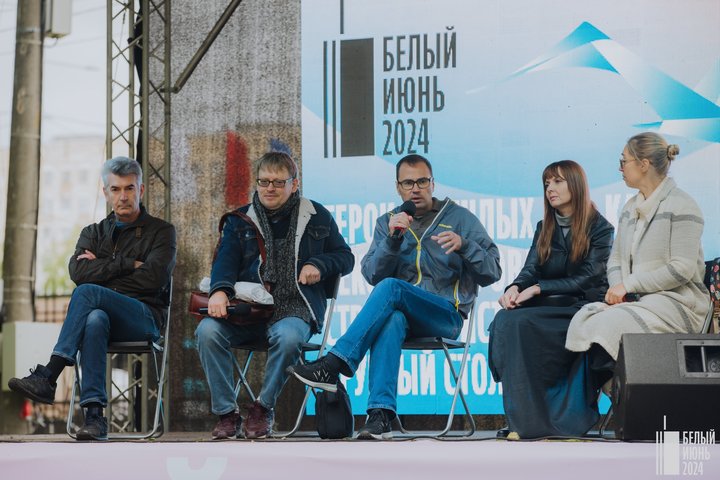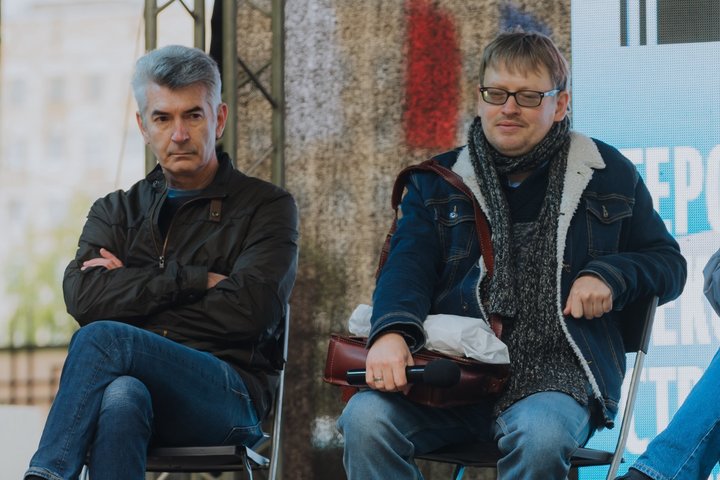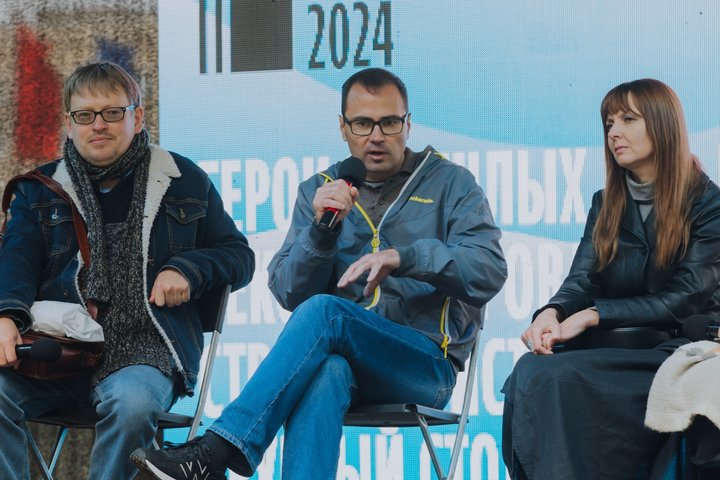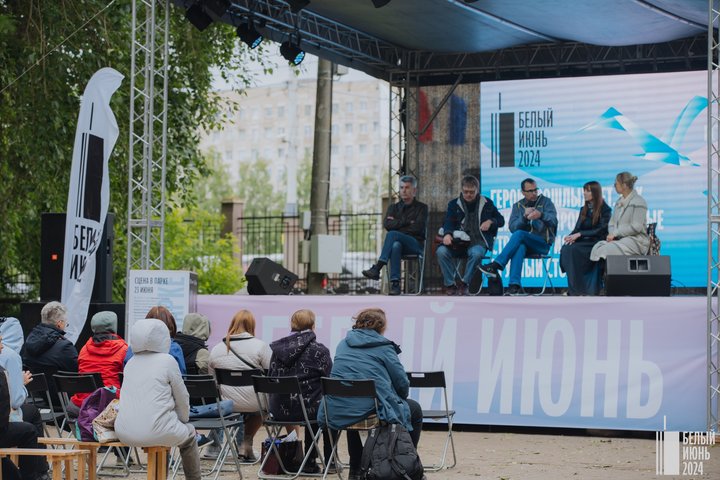Sergey Belyakov: ‘No need to invent, you need to find’
Modern writers explained how to restore forgotten pages of history in literary works

Historical novels are among the most popular not only in Russian-speaking literature but also in world literature. No matter what trends are sweeping the book world, historical books are, as they would say in social networks, “evergreen content.” At White June international book festival in Arkhangelsk, writers Andrey Rubanov, Sergey Belyakov, Vasily Avchenko and Helena Pobyarzhena talked about how to restore historical events in fiction and documentary works.
To disconnect from civilization or bury yourself in documents
The reenactment method is one of the most popular in the study of history. Everything can be restored: the course of battles, clothes, interiors and even cooking. According to writer Andrey Rubanov, the most difficult thing is to restore the thinking of a person who lived in times distant from us. To understand how such a person thought, the writer suggested going to a remote village, turning off the phone and completely distancing oneself from civilization for a month. This is one of the currently available ways to be in the shoes of, for example, a medieval person. The second option that Rubanov suggested is to go to work in a monastery.
Sergey Belyakov, the author of the book Parisian Boys in Stalin’s Moscow, calls himself first and foremost a historian, not a writer. He believes that nothing needs to be invented, because everything already exists in our history.
“No need to invent, you need to find. To find in documents, letters, in old newspapers. And then restore the world people lived in. I like this approach not only because of my professional preferences but also because there are a lot of lies and deceptions now. Today you read an article on the Internet, and tomorrow it is gone. Technology can make the past non-existing. And a historian digs up the real thing and tells us about what happened. This way, we all gain solid ground under our feet,” said Sergey Belyakov.

His book tells the story of Marina Tsvetaeva’s son –Georgy Mur Efron. Helena Pobyarzhina’s novel Valsarb is also dedicated to him. Mur died defending Helena’s hometown — Braslav. At the same time, this story is practically unknown in the writer’s homeland. Pobyarzhina was fascinated by Marina Tsvetayeva’s work since childhood and was very worried about the “oblivion of historical memory.”
“I thought about how to write the story of Mur for a long time. But at some point I had the idea to speak about a girl and a soldier who wanders like a ghost, the restless soul of the city. In the 1970s, a monument to Georgy Efron was erected near Braslav, but in the city itself, on the mass grave of the defenders of Braslav, his name is not there. And this is very sad,” said Helena Pobyarzhina.
In addition to the story of Mura, Helena Pobyarzhina touches on the topic of the Holocaust and the Braslav ghetto. According to her, the city’s residents still do not know this part of history.

Vasily Avchenko wrote a book about the Soviet writer Oleg Kuvayev who died in 1975 at the age of 40. As Avchenko said, it was not difficult for him to restore the life of the hero of his book, because many of the writer's contemporaries were still alive. He based his work primarily on numerous interviews with witnesses.
“In Moscow, I met with his relatives and heirs, with his older sister, and the writer’s nephew keeps his archive. Everything is quite simple here: there are a lot of documents and living testimonies. In addition, whenever possible, I travelled around Kolyma and Chukotka where I also found a number of documentary evidence and witnesses. If a historian looks for facts, then I had a different task — to find the key to creating a book, to find the intonation,” added Vasily Avchenko
“Language is one of the main characters of fiction”
When a writer conveys the atmosphere of the time, he or she faces the question of how to present the events, in what language, so that the modern reader understands. Andrey Rubanov noted that if we are talking about historical non-fiction literature, then the language should be as simple and understandable as possible for the modern reader. But in fiction, everything depends on the author’s taste. However, he later added that the more complex the stylisation, the fewer people will read the book.

This idea was supported by Sergey Belyakov. He said that he tries to write in a simple language. Although the language of the heroes in his works also does not need to be stylised, they are not far from our era. They mainly lived in the 19th and 20th centuries.
“Where it is necessary to quote an old document, I quote. In the book Mazepa’s Shadow, there are quotes in Ukrainian I specifically cited them in the original language with translation. The only thing is that I myself never switch to the language of a specific generation,” noted Sergey Belyakov.
Writer Alexey Avchenko does not quite agree with the opinion of his colleagues. He believes that when talking about non-fiction literature, it is necessary to add specifics. For example, there is a genre of documentary prose, in which, according to Avchenko, it is necessary to use all acceptable artistic techniques. He said that in this case, for a writer, not only the facts should be important, but also how they are presented, what images are used and what rhythm the text has.
“I write in a modern language, but specific words of a certain time are important to convey the era. I do this with the help of quotes from documents and letters, but I do not adjust the author’s speech to a certain time. The author’s voice belongs to the author, and the hero’s voice should have individual characteristics that are characteristic only of him, as well as of the time and territory,” added Avchenko

Speaking about Helena Pobyarzhina's work Valsarb, she considers “language to be one of the main characters of fiction.”
“In my case, language is the most important character. The thing is that I have been writing poetry all my life, so my prose is the prose of a poet. My novels have chapters that are completely written with rhyme,” said the writer.
When Helena Pobyarzhina was writing Valsarb, she studied not only Tsvetayeva’s biography but also the diaries of Georgy Efron. Pobyarzhina has magical elements in her novel, Mur appeared as a ghost to the main character. And the writer stylised his speech to match the real diaries of Tsvetayeva’s son.
There is an opinion that language is understandable for 200 years, and then the syntax changes. The language becomes difficult to understand. Not because of outdated words, but because of the different construction of the sentence and speech in general. Perhaps, in 200 years, schoolchildren from the future will look at the works of contemporary authors with the same bewilderment as today’s children look at The Tale of Igor’s Campaign.
Ekaterina Petrova is a book reviewer of Realnoe Vremya online newspaper, the author of Poppy Seed Muffins Telegram channel and founder of the first online subscription book club Makulatura.